Graham Reid | | 6 min read
I'd Rather Be Your Enemy
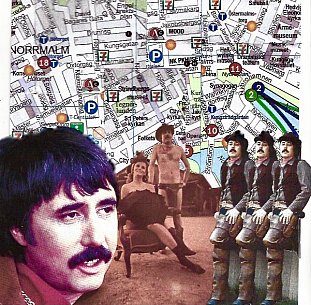
In the wider world of civilians, the reputation of Lee Hazlewood (who died a decade ago at age 78) rests on a couple of flimsy poles: Chief among them his work with Nancy Sinatra in the mid Sixties.
Some may be familiar with him for an earlier association with guitarist Duane Eddy as producer of his classic instrumentals Peter Gunn and Rebel Rouser, or for his '63 Trouble is a Lonesome Town which, if not a concept album was certainly in the zone as a series of themed songs with his rumbling baritone offering a forced but interesting narrative.
Fewer would know him as the guy who produced Something Stupid for Nancy and Frank Sinatra.
No, Lee Hazlewood – despite those influential duet hits with Nancy – is a cult figure and so mostly well below anyone's consciousness these days, despite his long career.
That might in part be because he moved to Sweden at the start of the Seventies and the self-styled cowboy used his Lee Hazlewood Industries label (LHI) for a series of what might almost be called vanity recordings.
And that makes the Light in the Attic reissue programme of Hazlewood's recordings even more admirable.
LITA (distributed in New Zealand by Southbound) have been re-presenting Hazlewood productions and solo albums in gatefold CD sleeves with pointed liner notes, lyrics and photos in lovely little booklets, to probably very little commercial return.
But that isn't stopping them and now three more have come down the lonesome Lee highway: Hazlewood with Ann-Margret on The Cowboy and The Lady ('69) and two just under his own name, Forty (also '69) and Requiem For An Almost Lady ('71).
These recordings are from what we might call his classic period: That is the time after Nancy's Boots Are Made For Walking which he penned, and of the latter two here the first was recorded in Nashville and the last in LA, although he'd already established himself in Stockholm.
So they should be of considerable interest to Lee aficionados which is a growing but still admittedly small cabal.
As with so many artists, Hazlewood was a self-invention. Although he was born in Oklahoma he was “as much of a cowboy as John Wayne” writes Hunter Lea in the liner notes to The Cowboy and The Lady.
And “In all the time we were together,” says his longtime partner/singer and graphic designer Suzi Jane Hokom, “there was nothing about Lee that wanted to be on a horse”.
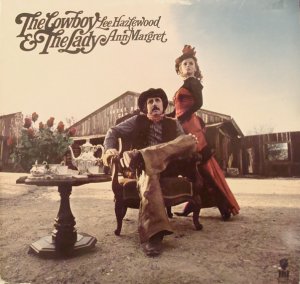 That hardly
mattered to the studio musicians in Nashville when Hazlewood and
Ann-Margret turned up to record a convincing collection of country
covers (and a few Lee originals) because he had the swagger to carry
it off, and she was the frilly-lace lady who had already been in the
city recording with many greats like Chet Atkins, Floyd Cramer, the
Jordanaires (as with Nancy Sinatra, Ann-Margret had appeared in an
Elvis movie, Viva Las Vegas) and Charlie McCoy.
That hardly
mattered to the studio musicians in Nashville when Hazlewood and
Ann-Margret turned up to record a convincing collection of country
covers (and a few Lee originals) because he had the swagger to carry
it off, and she was the frilly-lace lady who had already been in the
city recording with many greats like Chet Atkins, Floyd Cramer, the
Jordanaires (as with Nancy Sinatra, Ann-Margret had appeared in an
Elvis movie, Viva Las Vegas) and Charlie McCoy.
But Ann-Margret was no dispassionate singer like Nancy, she aimed for country cred alongside Hazlewood's monochromatic gravitas . . . which makes The Cowboy and The Lady an odd blend of song (her) and commentary (him) on familiar material like Am I That Easy Forget, JD Loudermilk's Break My Mind . . .
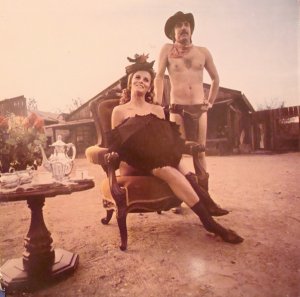 Although
Ann-Margret also goes for the whole twang on Only Mama That'll Walk
The Line, she pulls out her coy Fifties ballad voice for the sensual
You Can't Imagine, and Hazlewood nails the cliched lonesome narrative
of Greyhound Bus Depot. And he actually stretches himself into some
serious range on Walk Out of My Mind while she gets the angry,
wronged woman part.
Although
Ann-Margret also goes for the whole twang on Only Mama That'll Walk
The Line, she pulls out her coy Fifties ballad voice for the sensual
You Can't Imagine, and Hazlewood nails the cliched lonesome narrative
of Greyhound Bus Depot. And he actually stretches himself into some
serious range on Walk Out of My Mind while she gets the angry,
wronged woman part.
Also on The Cowboy and The Lady is their country/harmonica take on the excellent Tom Rush ballad No Regrets (“no tears goodbye”) which is fine but sends you to the original and the Walker Brothers '75 version. Also the Chip Moman/Dan Penn Dark End of the Street which here is so overwrought as to be off-putting. It is a classic ballad of stolen moment moments of illicit love. Their version is truly awful.
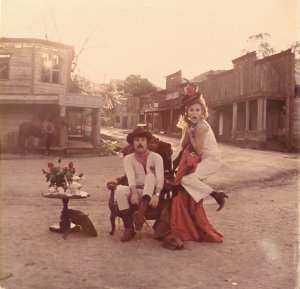 Hazlewood's
otherwise lovely original You Turned My Head Around here is shrill
(check out the better Dean and Britta version here).
Hazlewood's
otherwise lovely original You Turned My Head Around here is shrill
(check out the better Dean and Britta version here).
The oddities here in the reissue is among the additional tracks, notably the fuzzbox psychedelic rocker It's A Nice World to Visit (But Not to Live In) which is utterly out of place but brittle . . . and its diametric opposite, the pastoral string funk of Sleep in the Grass with strings arranged by Jimmie Haskell who'd just done a similar job on Simon and Garfunkel's Bookends.
It was a confusing time for ex-Elvis actresses, faux-cowboys, a wannabe country duo and those falling into the rural lifestyle . . .
“Sure is a bummer” Ann-Margret drops into Sleep in the Grass.
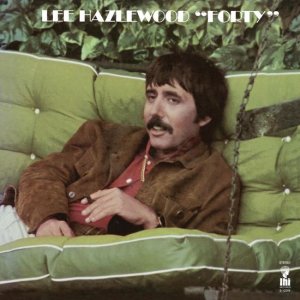 Lotta mixed-up
co-fusion/confusion on The Cowboy and The Lady . . . and Hazlewood's vision got
no more clear on Forty which was produced in London by the Kinks, Who and Easybeats hitmaker Shel Talmy.
Lotta mixed-up
co-fusion/confusion on The Cowboy and The Lady . . . and Hazlewood's vision got
no more clear on Forty which was produced in London by the Kinks, Who and Easybeats hitmaker Shel Talmy.
It opens with his version of the Frank Sinatra classic ennui of It Was A Very Good Year where he invites a comparison he can't match. In fact it's pretty bad and over-orchestrated for his voice. Check it out here.
Lovely orchestration throughout on Fifty though . . . but for the wrong singer. Hazlewood, god love him, neither had the vocal or emotional range to match Talmy's arrangements or the songs Lee covers (the exceptional post-party alcoholism regret of The Night Before and break-up morning of The Bed).
And quite why he chose to drag his monochromatic vocals through For Once in My Life which demands something approaching broken heroism is beyond human understanding.
And in the midst of all these failed ballads is Randy Newman's Let's Burn Down the Cornfields from his 12 Songs album?
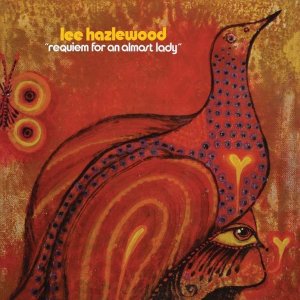 You can only guess
Lee Hazlewood had a very large and bankable cheque to pay everyone for
this odd album.
You can only guess
Lee Hazlewood had a very large and bankable cheque to pay everyone for
this odd album.
Good on you Light in the Attic . . . but Forty is 80 percent awful.
Which brings us to final entry in this current LITA reissue series, the dark and recommended Requiem For An Almost Lady which opens with the spoken word “In the beginning there was nothing, but it was kind of fun to watch nothing grow . . . “
Then Lee speak-sings, “ You came walking into my life, carrying your own dreams, you could have been, yeah, you could have been good . .. then why were were you so goddam mean . . . but til you I never had any fun . . . but I'm sure glad I never . . . Ain't you glad I never, be glad I never . . . owned a gun”.
Lee as Lou Reed.
From then on Requiem is a ride down into a Sunday morning coming down, and reflections and dreams of loss and loneliness and the break-up and maybe the recovery. This is a skeletal confessional account the equal of anything Kristofferson, Dylan, Waylon, Willie or Cash ever wrote.
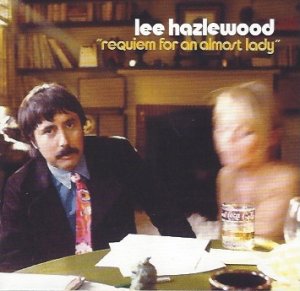 It's
a country break-up album imbued with bitterness full of mundane
detail, wishes and visions, and Hazlewood's spoken word interpolations (we
are back to Trouble is a Lonesome Town territory).
It's
a country break-up album imbued with bitterness full of mundane
detail, wishes and visions, and Hazlewood's spoken word interpolations (we
are back to Trouble is a Lonesome Town territory).
“Seems we are always doing something to hurt each other,” he says at the start of I'll Live Yesterdays, “ but you know you never really hurt me . . . until the fourth verse of this song . . .”
Hang for the first bitter first three, the equal of anything Reed penned about a fragmenting relationship, albeit in a folk country style.
“The knives that have cut you when others have touched you, have taken our children away. If there's no tomorrow for us, then I'll live yesterdays . . .”
And then to that final verse . . .
It matters not who Hazlewood is addressing in all this (the answers are out there, and in the oblique liner notes) but this is the Dark Stuff.
Other songs on this album are Little Miss Sunshine (Little Miss Rain), Stoned Lost Child (“I asked someone to watch over you . . . so if God if you've ever done anything right, watch over that stoned lost child for me tonight”), Come On Home To Me . . . and the final song is I'd Rather Be Your Enemy.
Divorce and estrangement is rarely as poetic, honest and cathartic as in these Lee Hazlewood lyrics and simple melodies.
The last lines on the original album (here with two extra tracks added) invite you in/out of these three albums: “In the end there was nothing, but believe me . . . it was no fun waiting for nothing to end.”
As Meat Loaf might have said of these three reissues – The Cowboy And The Lady, Forty and Requiem For An Almost Lady – that “two out of three ain't bad”.
For previous Lee Hazlewood and LHI reissues in this series start here.




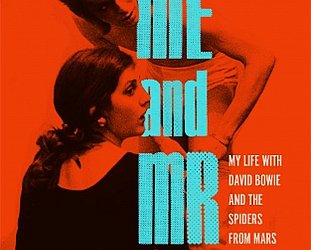
post a comment